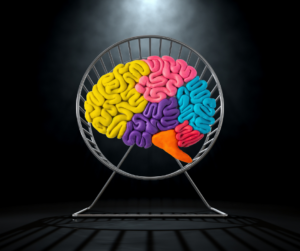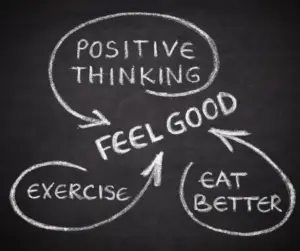Hamster Wheel Syndrome
Ever feel like your brain is running on a hamster wheel? The more you push, the more you end up mentally exhausted, out of focus, and drained. It’s not just the never-ending to-do lists or stressful days—this constant state of overwhelm can disrupt your sleep, drain your motivation, and even mess with your ability to perform at your best, both mentally and physically. And the culprit? Your brain’s natural balance might be out of whack, and your Heart Rate Variability (HRV) might be signaling the alarm. That’s where Clear Mind Neurofeedback comes in to help restore balance and improve your mental clarity.
But there’s good news! Meet Clear Mind Neurofeedback, a game-changing technique that acts like a gentle reset button for your mind. Think of it as tuning up your brain’s engine so that it runs smoothly and efficiently. With Clear Mind Neurofeedback, you’re not just managing stress—you’re actively enhancing your HRV, optimizing your brain’s natural production of vital neurotransmitters like GABA, serotonin, endorphins, and dopamine, and setting yourself up for peak mental and physical performance.
Curious to learn more? Let’s dive into the benefits of Clear Mind Neurofeedback and discover how it can help you regain balance, motivation, and that unstoppable feeling of being your best self!

Struggling to Find Calm, Focus, and Peak Performance?
Does it feel like you’re constantly running on empty, with your brain working overtime just to keep up? If you’re feeling mentally fried, unfocused, and exhausted, you’re not alone. Many people face this relentless pressure from all sides—work demands, family responsibilities, never-ending notifications, and a jam-packed to-do list. It’s like trying to juggle a dozen balls while walking a tightrope.
And when your brain is constantly in overdrive, it’s not just a mental game—it has real, physical consequences. When you’re stressed, your sympathetic nervous system (a.k.a. your fight-or-flight mode) is perpetually engaged, releasing cortisol and adrenaline in response to what your brain perceives as threats. While these stress responses are great in a life-or-death scenario, when it’s triggered by everything from emails to traffic jams, it can wreak havoc on your body and mind.
Here’s How Stress Messes with Your Brain and Body
- Chaotic Brainwaves: When you’re constantly stressed, your brainwaves become disorganized. Imagine your brain as an orchestra trying to play a symphony while the conductor is freaking out—everything goes out of sync!
- Low Heart Rate Variability (HRV): A chaotic brain and an overworked nervous system often lead to poor HRV—which is a critical indicator of your body’s ability to adapt to stress and recover. HRV measures the time variations between each heartbeat, and low HRV means that your body is having a hard time shifting between its stressed state and a state of relaxation.
- Hormone and Neurotransmitter Imbalance: When your brain is constantly on high alert, your body struggles to produce key neurotransmitters like GABA, serotonin, endorphins, and dopamine—the very chemicals responsible for making you feel calm, happy, motivated, and pain-free.
The Impact of Low HRV on Your Life
When your HRV is out of whack, your body and mind are constantly on edge. You might experience:
- Poor Sleep: Ever feel like you’re tossing and turning, unable to shut off your mind? That’s your sympathetic nervous system (fight-or-flight mode) refusing to clock out.
- Anxiety and Irritability: Low HRV and imbalanced neurotransmitters leave you feeling anxious, snappy, and emotionally drained.
- Low Energy and Motivation: When your brain can’t produce enough dopamine, it’s like trying to drive a car with no gas. You’re not going anywhere fast.
- Brain Fog and Poor Focus: Forgetting where you put your keys, struggling to finish simple tasks, or feeling like your mind is in a haze are all signs that your brain’s pathways need a reset.
Sound familiar? If you’re nodding your head, it’s time to consider a different approach to fixing this chronic cycle of stress and exhaustion.

Why Your Brain Needs a Tune-Up
Think of your brain as the control center for everything you do. It’s like the CEO of your life, making sure you stay focused, energized, and emotionally balanced. But what happens when your brain starts to feel like a worn-out CEO after a string of 18-hour workdays? Spoiler alert: chaos!
When your brain’s control center is on high alert all the time, it’s like your mental gears are stuck in overdrive. And just like an overworked CEO, your brain starts making poor decisions, forgetting important stuff, and throwing temper tantrums over the littlest things (hello, hanger-induced rage ).
The good news? Just like a tired car engine that needs an oil change, your brain might just need a little tune-up to get it back to running smoothly. And that’s where Clear Mind Neurofeedback steps in.
Running on the Hamster Wheel of Stress
You know that feeling when you’re running on a hamster wheel, chasing task after task, deadline after deadline? The more you push, the more you feel like you’re spinning in circles and going nowhere fast. Well, your brain is experiencing the same thing. When you’re constantly bombarded with stressors like work demands, family responsibilities, and life’s curveballs, your sympathetic nervous system goes into hyperdrive.
This fight-or-flight mode is designed to protect you in emergencies—like when you accidentally lock eyes with a mountain lion on your morning jog (yikes!). But if you’re in that high-alert mode all the time, even when dealing with minor stressors, your nervous system goes haywire, and that’s when things get messy.
Warning Signs That Your Brain Needs a Tune-Up
When your brain is stuck in overdrive, you might start noticing signs that your control center is struggling to keep things in check:
- Chaotic Brainwaves: Your brainwaves, which should be in sync like a finely tuned orchestra, end up all over the place. This makes it hard to concentrate, manage emotions, and feel calm. Imagine the chaos of a symphony without a conductor—nothing is working together!
- HRV Gone Haywire: Your Heart Rate Variability (HRV), a fancy way of saying how well your body handles stress, takes a nosedive. And low HRV means your body can’t smoothly shift from fight-or-flight mode to rest-and-relax mode. It’s like trying to drive a car stuck in first gear—it’s exhausting!
- Neurotransmitter Imbalance: When your brain is constantly in fight-or-flight mode, it’s like a factory running out of raw materials. It struggles to produce enough GABA, serotonin, endorphins, and dopamine—the very chemicals that keep you relaxed, happy, and motivated. It’s like your brain’s assembly line needs a major overhaul.
Why HRV is Your Brain’s Performance Report Card
Think of HRV as your body’s report card for handling stress. A high HRV means your nervous system is adaptable and resilient—ready to handle whatever life throws your way with a cool head. A low HRV? That’s like getting a “D” in Stress Management 101. And let’s face it—no one wants a failing grade in life’s most essential class!
How Stress is Sabotaging Your Happy Chemicals
When your HRV is out of balance, your brain starts scrambling to keep up. It can’t produce enough of the “happy chemicals” you rely on to feel good, focused, and motivated:
- Low GABA = more anxiety and irritability.
- Low serotonin = mood swings and a hard time enjoying life’s simple pleasures.
- Low dopamine = a lack of motivation and drive.
- Low endorphins = feeling like life’s a grind without that little boost of joy and comfort.
It’s like your brain’s fuel tank is running on empty, and the warning lights are all flashing!

How Clear Mind Neurofeedback Brings Balance and Clarity
Imagine if you could hit the “reset” button on your brain—taking all that mental clutter, stress, and brain fog and sweeping it away like crumbs on a countertop. That’s the magic of Clear Mind Neurofeedback. Think of it as a gentle nudge to your brain, helping it find its groove and get back into balance.
What Exactly Is Neurofeedback?
Okay, let’s break it down. Neurofeedback is like a personal training session for your brain. Instead of lifting weights to build muscles, neurofeedback uses gentle signals to help your brainwaves find their ideal rhythm. Your brain learns to shift from chaotic, stress-driven patterns into balanced, organized ones. It’s like getting a mental tune-up without all the grunting and sweat.
At Clear Mind Utah, we use a specific form of neurofeedback called IASIS Microcurrent Neurofeedback (MCN). And before you start imagining sci-fi movies with electrodes and electrical shocks—don’t worry, it’s nothing like that! IASIS MCN uses tiny electrical impulses that are so gentle, you won’t even feel them. These signals encourage your brain to release old, unhelpful patterns and reset to a more balanced state.
How Does It Work?
During an IASIS MCN session, you sit comfortably while sensors are placed on your scalp. These sensors send microcurrents to specific areas of your brain, prompting it to reorganize and regulate its activity. The result? Your brainwaves start to chill out, shifting away from that constant fight-or-flight mode and moving into a state of calm, clarity, and focus.
Think of it like giving your brain a gentle massage, soothing those overworked areas and helping it let go of patterns that no longer serve you. Over time, your brain becomes more efficient at switching gears, so you can face life’s challenges with a clear head and a steady heart.
The Domino Effect of Balance and Clarity
When your brain is functioning optimally, it creates a domino effect of positive changes throughout your entire body. Here’s what you can expect:
- Improved HRV: As your brainwaves become more balanced, your HRV starts to improve. A higher HRV means that your body can adapt to stress more efficiently, shifting in and out of relaxation mode with ease. It’s like upgrading your nervous system from a rickety old bike to a sleek, high-performance motorcycle.
- Reduced Anxiety and Stress: With balanced brainwaves, your mind is no longer stuck in overdrive. You can finally take a deep breath and feel like you’re back in the driver’s seat.
- Better Mood and Emotional Stability: Clear Mind Neurofeedback helps your brain produce more of the good stuff—serotonin, dopamine, GABA, and endorphins. These neurotransmitters are the secret sauce to feeling happy, calm, and motivated.
- Enhanced Focus and Mental Clarity: When your brainwaves are in sync, it’s easier to stay sharp and focused, whether you’re working, studying, or just trying to remember where you put your keys.
Why Clear Mind Neurofeedback Is Different
You might be wondering, “Okay, but how is Clear Mind Neurofeedback different from all the other stress-relief techniques out there?” Great question!
While traditional methods like meditation or exercise are excellent for calming your nervous system, they can take time to show results—and let’s be real, sometimes it’s tough to find the time or focus to meditate when your brain is buzzing like a swarm of bees. Neurofeedback, on the other hand, works directly with your brain to create real, measurable changes.
With IASIS MCN, many clients notice positive shifts after just a few sessions. It’s not magic, but it sure feels like it! The key is that neurofeedback gently retrains your brain to self-regulate, so the effects are long-lasting, and you’re not just masking the symptoms—you’re addressing the root cause.
Personal Experiences: What Clients Are Saying
Don’t just take our word for it. Our clients at Clear Mind Utah have shared incredible stories of how Clear Mind Neurofeedback has transformed their lives:
- “I’ve struggled with anxiety for years, and nothing seemed to help. But after a few sessions of IASIS MCN, I finally felt like I could breathe again.” —Jill, 39
- “My sleep improved so much, and I’m not snapping at my kids anymore. It’s like a weight has been lifted.” —Sarah, 45
- “I didn’t realize how foggy my mind was until it wasn’t anymore. I’m more productive at work, and I actually enjoy my weekends now.” —Mark, 52

Clear Mind Neurofeedback and GABA: The Brain’s Chill Pill
If your brain had a best friend that helped it stay cool, calm, and collected, that BFF would be GABA. But what exactly is GABA? Let’s break it down. GABA (short for gamma-aminobutyric acid) is your brain’s natural tranquilizer. It’s the chill pill that keeps the mental chaos at bay. When you’re running on empty and everything feels like it’s coming at you at 100 miles per hour, GABA steps in to help you slow down and breathe.
Think of it this way: Imagine your brain is a loud, crowded party. There’s music blaring, people shouting over each other, and you can’t even hear yourself think. That’s your brain on stress—overstimulated, overwhelmed, and overstressed. Now, picture someone turning down the music, getting the loud talkers to chill out, and dimming the lights a little. That’s what GABA does—it quiets the noise and brings a sense of calm to the chaos.
When Your Brain Runs Low on GABA
So, what happens if you don’t have enough GABA? Picture a high-strung, over-caffeinated manager trying to run an entire business without a single break. They’re jittery, snappy, and easily overwhelmed. That’s your brain on low GABA. And unfortunately, modern life—with all its deadlines, notifications, and constant pressures—has a way of draining this precious neurotransmitter faster than you can say “Zen.”
Low levels of GABA can lead to increased anxiety, irritability, and even trouble sleeping. It’s like your brain can’t catch a break, no matter how much you beg it to relax. The result? Your body feels tense, your mind is racing, and the idea of true relaxation seems like a distant dream.
But here’s the good news—Clear Mind Neurofeedback can help!
How Clear Mind Neurofeedback Boosts GABA Levels
The beauty of Clear Mind Neurofeedback is that it doesn’t just treat the symptoms; it goes straight to the source. By gently guiding your brainwaves into more balanced and organized patterns, neurofeedback encourages your brain to start producing more of its own GABA naturally. It’s like hiring a really good DJ for that overcrowded mental party—someone who knows exactly how to dial down the chaos and bring the vibe back to chill.
When your brainwaves are more balanced, your nervous system starts to calm down, and GABA production kicks into high gear. And because neurofeedback is non-invasive and gentle, your brain learns to maintain these healthier patterns on its own over time. You’re not just getting temporary relief—you’re teaching your brain how to stay calm even when life throws you a curveball.
The Benefits of Boosting GABA
By increasing your brain’s production of GABA through Clear Mind Neurofeedback, you can enjoy a whole host of benefits that go beyond just feeling “less stressed.” Here’s what you can expect:
- Say Goodbye to Anxiety and Hello to Zen: When your brain has enough GABA, those racing thoughts and jitters can finally slow down. You’re less likely to get overwhelmed by minor stressors, and you can face your day with a calm, collected mindset.
- Better Sleep, Naturally: GABA helps your brain wind down at night, making it easier to fall asleep and stay asleep. Forget tossing and turning—your nights can be as peaceful as a quiet beach at sunset.
- Improved Focus and Clarity: It’s hard to focus when your mind is a whirlwind of anxious thoughts. With more GABA in your system, your brain can filter out the noise and stay focused on what matters.
- Enhanced Emotional Balance: Low GABA levels can make you feel irritable and reactive. By boosting GABA, you’ll find it easier to maintain emotional stability and respond to challenges with a level head.
It’s Time to Let Your Brain Chill Out
At Clear Mind Utah, we believe that everyone deserves to feel at peace and in control of their own mind. If you’ve been feeling like your brain is stuck in overdrive and you’re longing for a little more inner calm, it’s time to let Clear Mind Neurofeedback step in. By giving your brain the gentle nudge it needs to produce more GABA, you’ll be amazed at how much lighter and more centered you can feel.

Serotonin: Your Feel-Good Friend
Serotonin is often referred to as the “feel-good” neurotransmitter, and for good reason. Think of serotonin as the social butterfly in your brain that keeps the party going. It’s the chemical that helps you feel content, optimistic, and just plain happy to be alive. But serotonin isn’t just about keeping your spirits high—it plays a much bigger role in how your entire body functions.
Imagine starting your day feeling refreshed, lighthearted, and ready to take on whatever comes your way. That’s serotonin in action. It helps stabilize your mood, regulate sleep, and even support your appetite and digestion. When serotonin is in balance, it’s like your brain has a sunny disposition, and you’re more likely to experience those little moments of joy and satisfaction throughout your day.
But when serotonin levels are low, that’s when the clouds start rolling in. You might feel down for no apparent reason, struggle with sleep, or find yourself more irritable than usual. It’s like your brain’s internal weather report has turned gloomy, making it tough to find the silver linings.
How Life Drains Your Serotonin
Serotonin is naturally produced in your brain and intestines, and while it’s pretty good at keeping you on an even keel, life’s relentless stressors can start to chip away at your serotonin reserves. It’s like trying to keep your energy up on an empty stomach—eventually, you hit a wall. When your brain is constantly dealing with stress, worry, or even poor sleep, it can’t keep up with the demand for serotonin. And without enough of this feel-good neurotransmitter, your mood and overall well-being take a hit.
Low serotonin can lead to mood swings, anxiety, and even difficulty enjoying things that once brought you happiness. It’s like someone turned down the volume on the “happy” knob in your brain. And that’s not all—low serotonin can also mess with your sleep cycle, causing restlessness and making it harder to recharge at night.
How Clear Mind Neurofeedback Supports Serotonin Production
Enter Clear Mind Neurofeedback—a solution designed to help your brain get back on track. Neurofeedback works by gently encouraging your brain to self-regulate and find its natural rhythm. Think of it as guiding your brainwaves into a more harmonious flow, where they can work together to keep everything in balance.
During a neurofeedback session, your brain is prompted to shift away from old, unhelpful patterns and move towards a state of calm and clarity. As your brainwaves become more organized and your nervous system relaxes, it creates the perfect environment for serotonin production. Your brain essentially learns to flip the switch back to “sunny,” allowing more serotonin to flow naturally.
This is why many people who undergo Clear Mind Neurofeedback report not just a reduction in stress and anxiety, but also an improvement in their overall mood and outlook. With more serotonin in your system, you’re more resilient to life’s ups and downs, and those everyday challenges don’t feel as overwhelming.
The Benefits of Boosting Serotonin Levels
So, what does a boost in serotonin feel like? It’s not like flipping a light switch where you suddenly feel elated and energized (though that would be nice). Instead, the changes are often subtle but significant. Here’s what you can expect when your serotonin levels are in a healthy range:
- Improved Mood and Optimism: When your serotonin levels are balanced, you’re less likely to get caught in negative thought loops. You’ll find it easier to stay positive and enjoy the little things in life.
- Better Sleep Patterns: Serotonin helps regulate your sleep-wake cycle, making it easier to fall asleep and stay asleep. No more tossing and turning or staring at the ceiling in frustration.
- Emotional Stability: A balanced serotonin level means you’re less likely to experience those mood swings that come out of nowhere. You’ll feel more emotionally steady and in control.
- Enhanced Sense of Well-Being: When your brain has enough serotonin, it’s like everything just clicks into place. You’ll feel more content, relaxed, and ready to face whatever life throws your way.
Why This Matters for Your Long-Term Well-Being
Serotonin is more than just a mood booster—it’s essential for overall health and happiness. Low levels of serotonin have been linked to a range of issues, from mood disorders to sleep problems and even appetite irregularities. When you think about it, serotonin is like the foundation of a well-balanced, resilient mind.
That’s why Clear Mind Neurofeedback isn’t just about treating the symptoms of stress or anxiety. It’s about giving your brain the tools it needs to restore balance and well-being from the inside out. By encouraging healthy serotonin production, neurofeedback helps you experience more of those feel-good moments that make life worth living.
In the end, serotonin isn’t just your feel-good friend—it’s your brain’s secret weapon for facing life with optimism, resilience, and a smile on your face.

Endorphins: Nature’s Painkillers
You’ve probably heard people talk about a “runner’s high”—that euphoric feeling of joy and energy that comes after a great workout. You might be surprised to learn that this isn’t just a catchy phrase; it’s a direct result of your brain releasing endorphins. These powerful little chemicals act like nature’s own painkillers and mood boosters, flooding your body with a sense of relief and well-being when you need it most.
Endorphins are your brain’s way of giving you a high-five for pushing through the tough stuff. Whether it’s finishing a challenging run, surviving a stressful day at work, or even having a good laugh with friends, endorphins are released to help you feel a little lighter and a lot more resilient. They’re the reason why exercise, laughter, and even certain foods (hello, dark chocolate) leave you with a sense of satisfaction and happiness.
But endorphins aren’t just about creating fleeting moments of joy. They play a critical role in managing pain, reducing stress, and stabilizing your mood. In fact, they’re your brain’s way of balancing out the discomforts of life with some much-needed relief.
When Life Drains Your Endorphins
Here’s the thing—your body can only produce a certain amount of endorphins, and when you’re constantly dealing with stress, pain, or emotional challenges, your reserves can start to run low. When you’re living in a constant state of tension or overwhelm, your brain’s ability to produce endorphins diminishes, which means your natural defenses against pain and stress weaken.
Imagine going through your day without that internal buffer against the tough moments. Without enough endorphins, you might experience heightened sensitivity to pain, irritability, or a lingering sense of dissatisfaction. Even minor annoyances can feel like big hurdles when your brain’s supply of these mood-boosting chemicals is depleted.
This is why activities like exercise, meditation, and even laughter are often recommended for stress relief—they encourage your brain to release more endorphins, helping you cope better. But what if your brain needs an extra push to get those endorphins flowing consistently?
How Clear Mind Neurofeedback Boosts Endorphin Production
This is where Clear Mind Neurofeedback comes into play. Unlike other methods that rely on external actions or substances to trigger endorphin release, neurofeedback works directly with your brain to encourage natural production from within. Here’s how it works:
During a neurofeedback session, your brain receives subtle signals that help it reorganize and reset its patterns. These signals guide your brain away from the stress-induced fight-or-flight mode and towards a more relaxed, balanced state. As your brainwaves become more organized, it creates an environment where endorphins can be produced more effectively.
Think of it as giving your brain the opportunity to relax and take a deep breath. When your nervous system isn’t constantly on high alert, your brain has the bandwidth to release endorphins, rewarding you with that sense of relief and well-being. And because neurofeedback is a gentle, non-invasive technique, you’re not forcing anything—you’re simply giving your brain the tools it needs to work at its best.
The Benefits of Healthy Endorphin Levels
When your brain is producing enough endorphins, the effects go far beyond just feeling “a little better.” Here are some of the key benefits of having these powerful chemicals in balance:
- Reduced Perception of Pain: Endorphins work like your brain’s natural painkillers, diminishing your perception of pain and making it easier to cope with discomfort. This is especially helpful if you’re dealing with chronic pain or recovering from an injury.
- Improved Mood and Emotional Resilience: Endorphins help you maintain a positive outlook, even when life gets tough. They act as a buffer against stress, giving you the emotional resilience to handle challenges without feeling overwhelmed.
- Increased Sense of Pleasure and Satisfaction: Whether it’s enjoying a meal, finishing a project, or spending time with loved ones, endorphins enhance your overall sense of pleasure and satisfaction. They’re the brain’s way of rewarding you for doing things that are good for you.
- Enhanced Stress Management: With more endorphins in your system, your ability to manage stress improves. You’re less likely to react impulsively or feel weighed down by everyday pressures, which helps you maintain a sense of calm and control.
Why Clear Mind Neurofeedback Matters for Endorphin Production
Traditional methods for boosting endorphins, like exercise or meditation, can be incredibly effective, but they often rely on you being in the right mindset or having the time to dedicate to these activities. And let’s be honest—when you’re stressed or in pain, finding the motivation to exercise or meditate can be easier said than done.
That’s where Clear Mind Neurofeedback stands out. It doesn’t require intense focus, physical effort, or a specific environment. Instead, it works with your brain’s natural rhythms to promote balance and endorphin production. By encouraging your brain to produce more endorphins on its own, neurofeedback helps create lasting changes in how your mind and body handle pain and stress.
At Clear Mind Utah, we believe that endorphins are one of your body’s greatest assets. When your brain is producing enough of these feel-good chemicals, life’s challenges seem more manageable, and the moments of joy feel more profound. That’s why our approach with Clear Mind Neurofeedback is focused on not just relieving symptoms temporarily, but empowering your brain to maintain balance and resilience long-term.
Endorphins might be called “nature’s painkillers,” but they’re also so much more—they’re the secret to living with a greater sense of joy, connection, and strength. And who doesn’t want more of that?

Dopamine: The Motivator Molecule
Dopamine is often called the brain’s “motivator molecule,” and it’s easy to see why. Imagine a surge of energy that makes you want to get up, get moving, and achieve your goals. That’s dopamine in action. It’s the neurotransmitter that fuels your drive, focus, and pleasure, acting as your brain’s very own cheerleader.
But dopamine doesn’t just give you a quick boost of motivation. It plays a crucial role in everything from controlling your mood to enhancing memory and even regulating movement. When your brain produces a healthy amount of dopamine, you’re more likely to feel energized, optimistic, and ready to tackle whatever life throws your way. It’s what makes you feel excited to start a new project, finish a task, or even anticipate the reward of a job well done.
What Happens When Dopamine Levels Are Low?
When dopamine levels are low, the effects are noticeable and not in a good way. Think about those days when you can barely muster the energy to get out of bed, let alone accomplish anything. You might find it harder to focus, struggle to find joy in activities you once loved, and feel unmotivated to take on new challenges. This isn’t just a matter of feeling “off”—low dopamine levels can seriously impact your mood, productivity, and overall well-being.
Low dopamine levels have been linked to conditions such as depression, anxiety, and chronic fatigue. Research even shows that when the brain is deficient in dopamine, it can lead to symptoms like apathy, lack of motivation, and an overall sense of dissatisfaction. It’s as if your brain’s reward system has gone offline, making even the simplest of tasks feel like a monumental effort.
According to an article published in the journal Frontiers in Human Neuroscience, dopamine is closely tied to what’s known as the “reward system” of the brain, which is responsible for reinforcing behaviors that bring pleasure and satisfaction. This system drives motivation and reward-seeking behavior, encouraging you to pursue activities that bring fulfillment and success. When this system functions well, you’re more likely to take action, learn new things, and achieve your goals. The article also emphasizes dopamine’s role in sustaining focus and building positive habits over time. You can read more about this research in the full article here.
How Clear Mind Neurofeedback Supports Healthy Dopamine Levels
So, how can Clear Mind Neurofeedback help boost your brain’s production of dopamine? Neurofeedback works by encouraging your brain to self-regulate and shift away from old, unhelpful patterns. During a neurofeedback session, gentle microcurrents prompt your brain to reorganize its electrical signals. This reorganization not only helps improve brainwave patterns but also creates the ideal conditions for your brain to produce more dopamine naturally.
When your brainwaves are balanced, your nervous system becomes more efficient at responding to challenges and regulating mood. This balance supports the healthy production of neurotransmitters like dopamine, giving you that extra boost of energy and motivation.
The Benefits of Healthy Dopamine Levels
When your brain is producing dopamine at optimal levels, it doesn’t just make you feel good—it positively impacts multiple areas of your life. Here’s what you can expect when your dopamine levels are in balance:
- Increased Motivation and Drive: Dopamine is the chemical that gets you excited about setting goals and achieving them. When your dopamine levels are healthy, you’re more likely to stay motivated, push through challenges, and feel rewarded for your efforts.
- Enhanced Focus and Mental Clarity: If you’ve ever had a day where you felt laser-focused and on top of your game, you’ve experienced the benefits of dopamine. Healthy dopamine levels improve your ability to concentrate, think critically, and stay engaged in whatever you’re doing.
- Elevated Mood and Emotional Resilience: Dopamine isn’t just about motivation—it also plays a key role in regulating your mood. When your brain’s reward system is firing on all cylinders, you’re more likely to feel positive, enthusiastic, and emotionally stable.
- Better Habit Formation and Goal Achievement: Dopamine reinforces the brain’s reward pathways, making it easier to form new habits and stay committed to achieving your goals. When you succeed, the dopamine reward strengthens that behavior, encouraging you to continue striving for success.
Why Dopamine Matters for Your Well-Being
Dopamine isn’t just another neurotransmitter—it’s a key player in your brain’s ability to adapt, learn, and grow. It influences everything from how you handle stress to how you approach challenges and even how you experience pleasure. When dopamine levels are healthy, you’re more driven, focused, and resilient in the face of obstacles. And that means you’re not just surviving—you’re thriving.
At Clear Mind Utah, our mission is to help you unlock your brain’s full potential through Clear Mind Neurofeedback. By encouraging your brain to self-regulate and produce more dopamine naturally, neurofeedback empowers you to reclaim your motivation, focus, and sense of well-being.
If you’re ready to boost your brain’s performance and experience the benefits of balanced dopamine levels, let’s get started on your journey to a clearer, more motivated mind.

Why This Combination Matters: Better Together
Think of your brain and body as a finely tuned orchestra—each section plays a critical role in creating harmony. If one instrument is out of sync, the entire performance suffers. This is what happens when your HRV (Heart Rate Variability) or key neurotransmitter levels are off balance. But when you combine the benefits of improved HRV and balanced neurotransmitter production through Clear Mind Neurofeedback, the results can be truly transformative.
The Synergy of HRV and Neurotransmitter Balance
When your HRV is optimized, your nervous system becomes more flexible and adaptable, allowing you to switch seamlessly between “fight or flight” and “rest and digest” modes. This adaptability is vital because it determines how effectively you can handle stress, recover from challenges, and remain resilient in the face of life’s pressures.
At the same time, Clear Mind Neurofeedback supports your brain’s ability to maintain healthy levels of neurotransmitters like GABA, serotonin, endorphins, and dopamine. This balanced production is what helps you stay relaxed, motivated, emotionally steady, and pain-free.
When these two factors—HRV and neurotransmitter balance—are working together, they create a powerful synergy that enhances not only your mental clarity and mood but also your overall well-being. You’re no longer reacting to life’s stressors on autopilot; instead, you’re responding with greater control, focus, and a sense of calm.
A Holistic Approach to Mental and Physical Well-Being
What makes Clear Mind Neurofeedback so effective is that it doesn’t just address one piece of the puzzle. Instead, it takes a holistic approach, working on multiple levels to help your brain and body achieve a state of balance. By guiding your brain to self-regulate and reorganize its patterns, neurofeedback optimizes your HRV while simultaneously improving neurotransmitter production. This combination empowers you to handle stress more effectively, maintain emotional stability, and stay motivated to pursue your goals.
If you’re eager to learn more about how improving HRV can enhance your physical and mental performance, check out our article, “HRV: The Key to Superior Athletic Performance,” where we dive into the connection between balanced HRV and peak physical output. Or, if you’re looking for practical ways to manage stress, read our piece on “Stress Relief with Proven Neurofeedback” to discover how neurofeedback can help you reclaim your sense of calm and clarity.
Your Brain’s Transformation Begins Here
At Clear Mind Utah, we’re all about empowering you to take charge of your mental and emotional well-being. Clear Mind Neurofeedback isn’t just about reducing stress—it’s about creating long-term changes in how your brain functions, so you can live with more clarity, confidence, and joy.
Ready to take the next step toward a clearer, more balanced mind? Contact us at (385) 304-4434 to schedule your FREE Consultation and start your journey to feeling your best!






